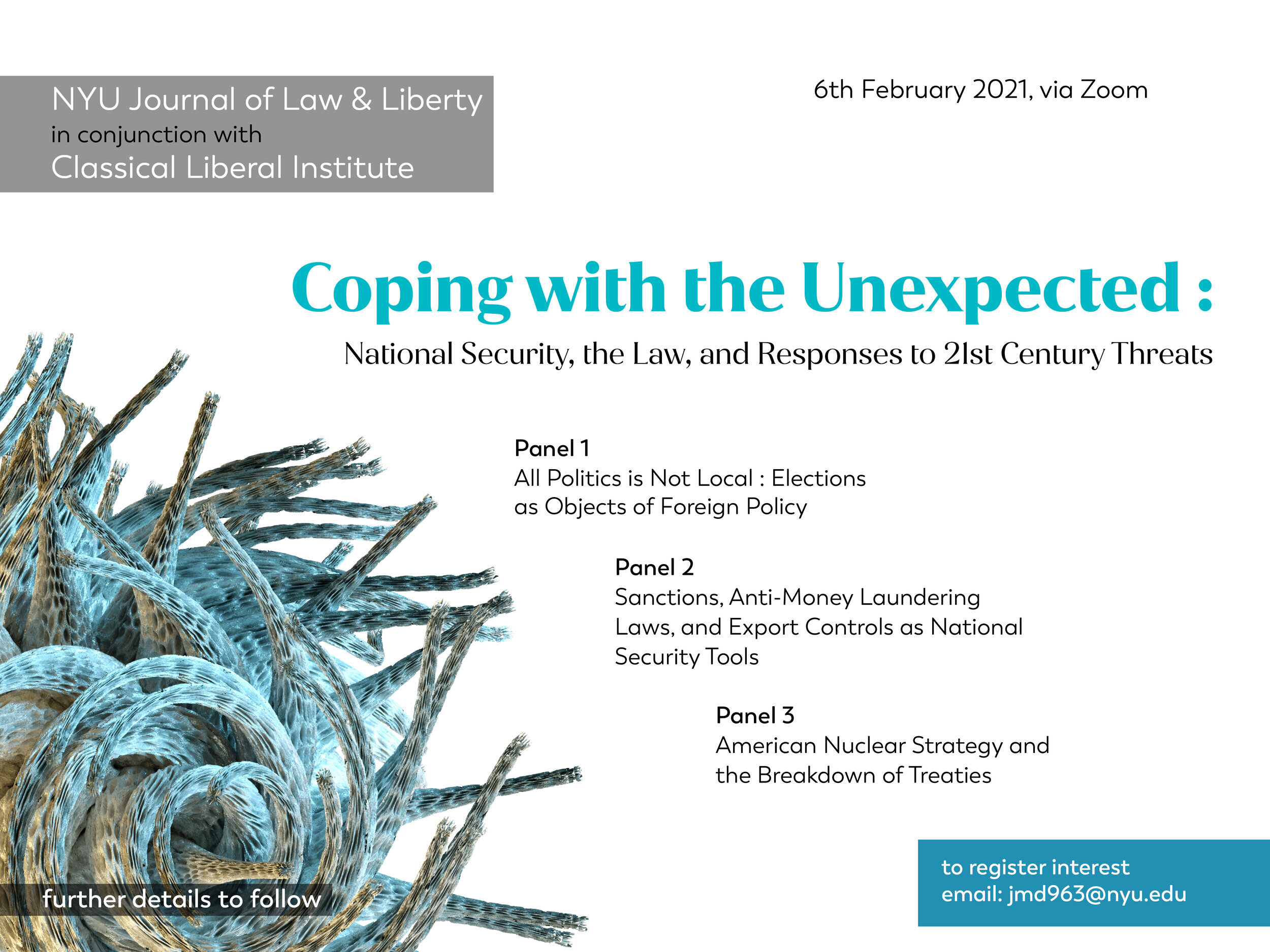
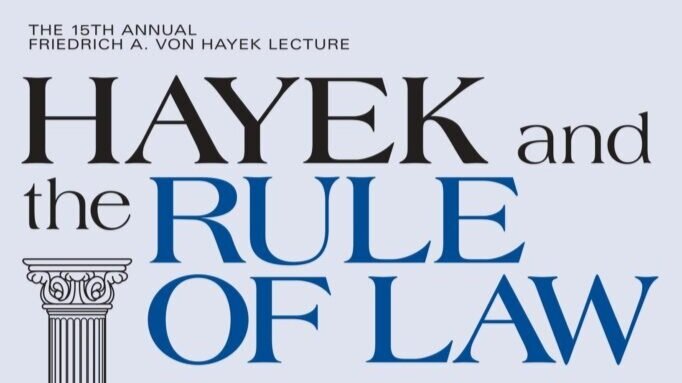
Fifteenth Annual Hayek Lecture
The Classical Liberal Institute and the NYU Journal of Law and Liberty are pleased to present the Fifteenth Annual Hayek Lecture, to be delivered by the Honorable Raymond M. Kethledge (US Court of Appeals for the Sixth Circuit) on “Hayek and the Rule of Law.”
Thursday, November 7, 2019
New York University School of Law
Greenberg Lounge, Vanderbilt Hall
(40 Washington Square South, New York, New York 10012)
6:00pm – 8:00pm, reception to follow
Approved for 1.5 credits of CLE in the Areas of Professional Practice category, this event is appropriate for both newly admitted and experienced attorneys.
Please RSVP here: https://nyu.qualtrics.com/jfe/form/SV_0w7luqda4xvJ2e1
Raymond M. Kethledge is a circuit judge on the U.S. Court of Appeals for the Sixth Circuit, to which he was appointed on July 8, 2008. He received his B.A. in history from the University of Michigan in 1989 and his J.D. from Michigan Law School in 1993. He clerked for Justice Anthony Kennedy of the U.S. Supreme Court and Judge Ralph B. Guy Jr. of the U.S. Court of Appeals for the Sixth Circuit. He also worked in the U.S. Senate and later, with two partners, founded a boutique litigation firm, now known as Bush Seyferth & Paige PLLC, in Troy, Michigan. His practice there included a broad mix of trial-court, appellate, and class-action litigation. Judge Kethledge is also the co-author of a book on leadership, entitled Lead Yourself First: Inspiring Leadership Through Solitude, which was published by Bloomsbury.
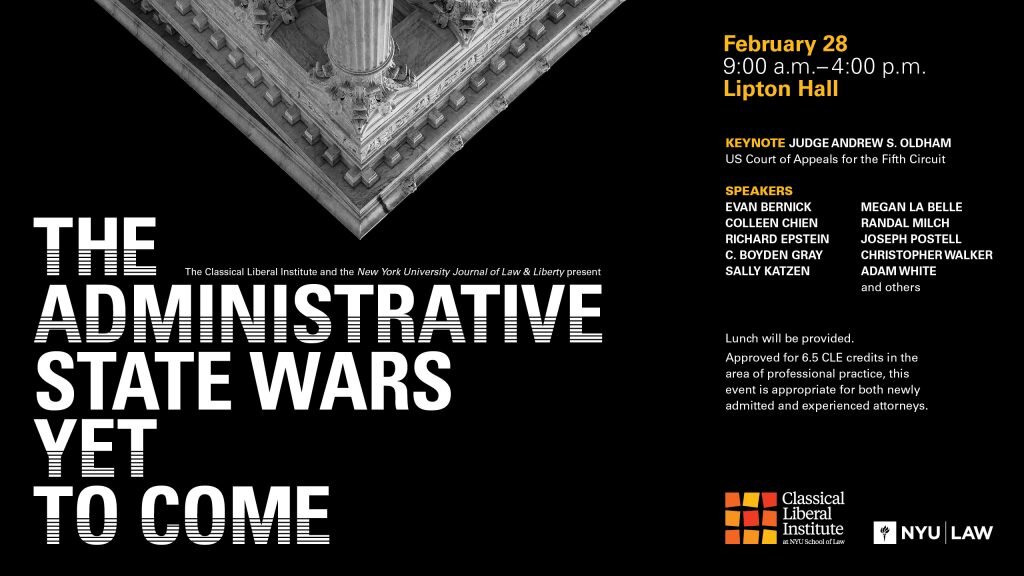
The Administrative State Wars Yet to Come
The Trump Administration has boasted of the “most far-reaching regulatory reform” in U.S. history. Meanwhile, the modern knowledge economy disrupts the very industries around which New Dealers had previously built up our Executive Agencies. And the last three Justices appointed to the Supreme Court are either prominent defenders of (Justice Kagan) or opponents of (Justices Gorsuch and Kavanaugh) the regulatory state as constructed. It appears the next generation’s most critical Supreme Court battles will be over the shape and powers of the “Fourth Branch of Government.” To understand these looming doctrinal contests, we will explore the history of the administrative state, contemporary cases on the Constitutionality of agency adjudication, and the impact of new technology on industrial organization, which demands new frameworks for regulatory responses.
Thursday, February 28, 2019
9:00am – 4:00pm
Lipton Hall
108 West Third Street
New York, NY 10012
Registration & Coffee (8:40-9:10 a.m.)
Opening Remarks (9:10-9:15 a.m.)
Panel 1 – The Administrative State in Historical Context
This panel will explore the evolution of administrative law and practice in light of America’s political and economic transformations. It will examine how historical events and doctrinal moves led to greater regulatory authority being delegated to centralized, executive agencies. This panel is geared toward presenting the deep premises and tensions underlying modern debates over administrative law to lawyers who may interact with the administrative state through regulatory enforcement actions, programs for compliance with guidance and rules, public policy work, or appellate and constitutional practice touching administrative issues.
Moderator: Mario J. Rizzo, Economics Department at NYU Graduate School of Arts and Science
Panelists: C. Boyden Gray, Boyden Gray & Associates
Sally Katzen, NYU School of Law
Joseph Postell, University of Colorado at Colorado Springs
Adam White, George Mason University Center for the Study of the Administrative State
Coffee Break (10:45 a.m.)
Panel 2 – Agency Adjudication and the Rule of Law (11:00 a.m.-12:30 p.m.)
What are the separation of powers ramifications of recent opinions in Lucia v. SEC and Oil States v. Greene, respectively holding that SEC ALJs are “officers of the United States” subject to the appointments clause, and that administrative patent adjudications do not violate Article III or the VIIth Amendment? What might a ruling in Gundy v. United States mean for nondelegation and the rule of law?
Moderator: Richard Epstein, NYU School of Law
Panelists: Evan Bernick, Georgetown Law
Megan La Belle, Columbus School of Law
Christopher Walker, Ohio State University Moritz College of Law
Lunch (12:30 p.m.)
Panel 3 – The Administrative State Meets the Tech Economy (1:30-3:00 p.m.)
As the knowledge economy displaces the industrial economy, disrupting all aspects of life from labor to trade to communications, how can an administrative state built to regulate a bygone era adapt?
Moderator: Max Raskin, NYU School of Law
Panelists: Robert M. Bernstein, U.S. Department of Labor
Colleen Chien, Santa Clara University School of Law
Randal Milch, NYU School of Law
Keynote: “The Anti-Federalists & Executive Power” (3:00 – 4:00p.m.)
Judge Andrew S. Oldham (U.S. Court of Appeals for the Fifth Circuit) will discuss the ani-federalist’ stance on executive power. Much has been written about whether and to what extent the administrative state comports with Article II of the Constitution. Much less has been written about the Anti-Federalist concerns with that Article. In this keynote speech, Judge Oldham will explore who the Anti-Federalists were, why they worried, and how their concerns inform modern debates over administrative law.
The event was approved for 6 CLE credits in the area of professional practice.
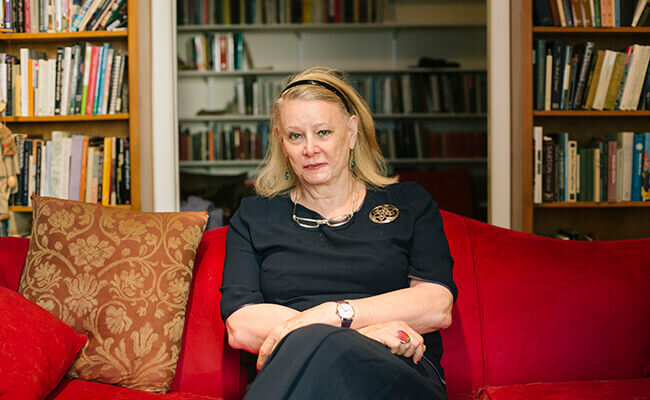
Fourteenth Annual Hayek Lecture
On October 4, 2018 the Classical Liberal Institute and the NYU Journal of Law and Liberty was pleased to present the Fourteenth Annual Friedrich A. von Hayek lecture delivered by Professor Deirdre N. McCloskey (Professor Emerita of Economics, History, English, and Communication at the University of Illinois at Chicago), titled “Hayekian Liberalism Enriched Us All.”
Thursday, October 4, 2018
6:00 – 8:00pm
Vanderbilt Hall, Greenberg Lounge
40 Washington Square South, New York, NY 10012
A reception followed the lecture.
The event was recorded and can be found here: https://www.youtube.com/watch?v=Ff4vatpXxEI&feature=youtu.be
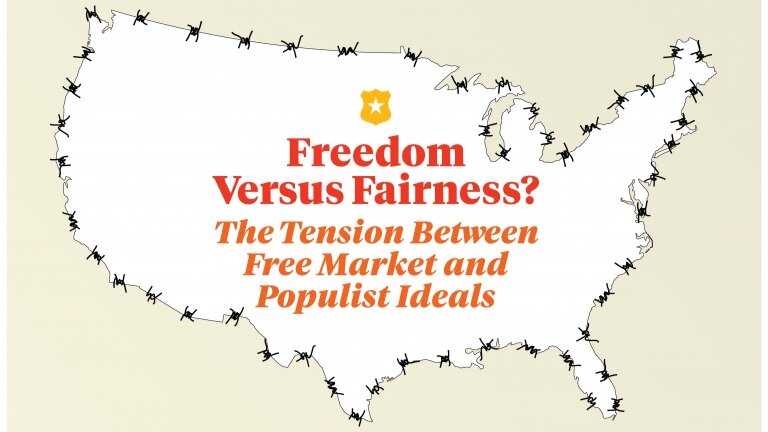
Freedom v. Fairness: The Tension Between Free Market and Populist Ideals in Labor
The Classical Liberal Institute and the New York University Journal of Law & Liberty present
Freedom versus Fairness:
The Tension Between Free Market and Populist Ideals in Labor
Tuesday, February 27, 2018
Vanderbilt Hall, Greenberg Lounge
This symposium will bring together leaders in law and economics to explore topical issues in the regulation of labor. Consisting of two panels and a keynote speech, the symposium will discuss various legal frameworks that attempt to create and enforce fair labor standards. The first panel will discuss legislation that regulates the domestic labor force, with special attention toward Janus v. AFSCME. The second panel will discuss recent executive orders and their implications on immigrant labor in the United States.
Approved for 3.5 CLE credits in the area of professional practice, this event is appropriate for both newly admitted and experienced attorneys.
Please RSVP here by clicking here or copying and pasting the following link in your browser: goo.gl/7i3qpk
Schedule of Events
8:30am: Breakfast and Registration
9:00am: Opening Remarks
9:15am: First Panel: Janus and ‘Fair Share’ Fees
Moderator: Richard Epstein, Classical Liberal Institute and NYU School of Law
Panelists: Samuel Estreicher, NYU School of Law
David A Schwarz, Irell & Manella
Liya Palagashvili, SUNY-Purchase
10:30am: Keynote Address by the Honorable John M. True III
11:00am: Coffee Break
11:15am: Second Panel: The Free Movement of Labor
Moderator: Mario Rizzo, Classical Liberal Institute and NYU School of Arts and Science
Panelists: Ilya Somin, George Mason University
Kit Johnson, University of North Dakota
Michael LeRoy, University of Illinois
Lori A. Nessel, Seton Hall University
12:30pm: Lunch
The entire event was filmed and is available on Youtube.
Panel 1 “Janus and ‘Fair Share’ Fees”: https://www.youtube.com/watch?v=t8TLiTY0lNk&feature=youtu.be
featuring: Richard A. Epstein (NYU Law), Samuel Estreicher (NYU Law), Liya Palagashvili (SUNY-Purchase) and David A. Schwarz (Irell & Manella)
Keynote Speech: https://www.youtube.com/watch?v=BemQssgpzRg&feature=youtu.be
presented by the Honorable John M. True III
Panel 2 “The Free Movement of Labor”:https://www.youtube.com/watch?v=meCLXki7M30&feature=youtu.befeaturing: Kit Johnson (University of North Dakota), Michael LeRoy (University of Illinois), Lori A. Nessel (Seton Hall University), Mario J. Rizzo (NYU School of Arts and Science), Ilya Somin (George Mason University)
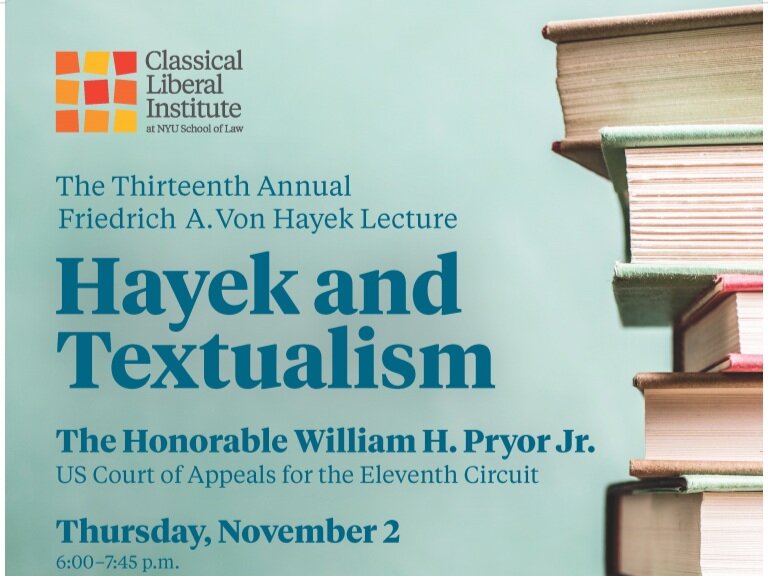
Thirteenth Annual Friedrich A. von Hayek Lecture
Thursday, November 2, 2017 | 6:00 PM – 8:00 PM
New York University School of Law
Greenberg Lounge, Vanderbilt Hall
40 Washington Square South, New York, NY 10012
The Classical Liberal Institute and the NYU Journal of Law and Liberty present the Thirteenth Annual Friedrich A. von Hayek lecture: “Hayek and Textualism” by the Honorable William H. Pryor Jr.
Approved for 1.5 CLE Credits in the area of professional practice, this event is appropriate for both newly admitted and experienced attorneys.
Please register by clicking here or following the link posted below:
https:/yu.qualtrics.com/jfe/form/SV_26w2Cg9ZUyXNp7n
There will be a reception following the lecture.
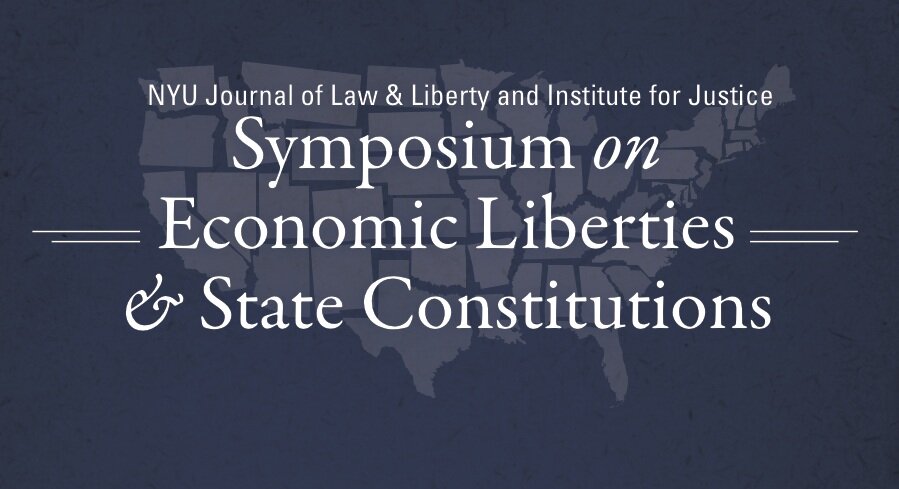
Symposium On Economic Liberties & State Constitutions
What: NYU Journal of Law & Liberty and Institute for Justice Symposium on Economic Liberties & State Constitutions State constitutions have protected our liberties since the Founding. But scholars have devoted precious little attention to how they protect economic liberties. This event brings together several eminent scholars to begin to fill that void.
Speakers: Keynote address by Hon. Robert S. Smith, formerly of the New York Court of Appeals. Papers by Professor Steven G. Calabresi (Northwestern), Professor James W. Ely, Jr. (Vanderbilt), Professor Richard A. Epstein (NYU), and Dean Daniel B. Rodriguez (Northwestern).
When: Friday, April 10, 2015, 8:15 a.m. – 12:30 p.m.
Where: Lester Pollack Colloquium Room, Furman Hall, New York University School of Law, 245 Sullivan St., New York, New York
Please register via email to mlopresti@ij.org or asanders@ij.org and indicate if staying for lunch afterward. Registration & lunch are free, but space is limited. Reservations on a first-come, first-served basis.








